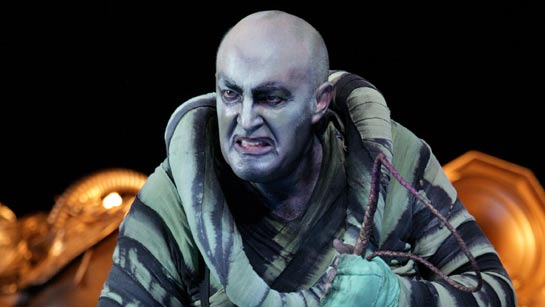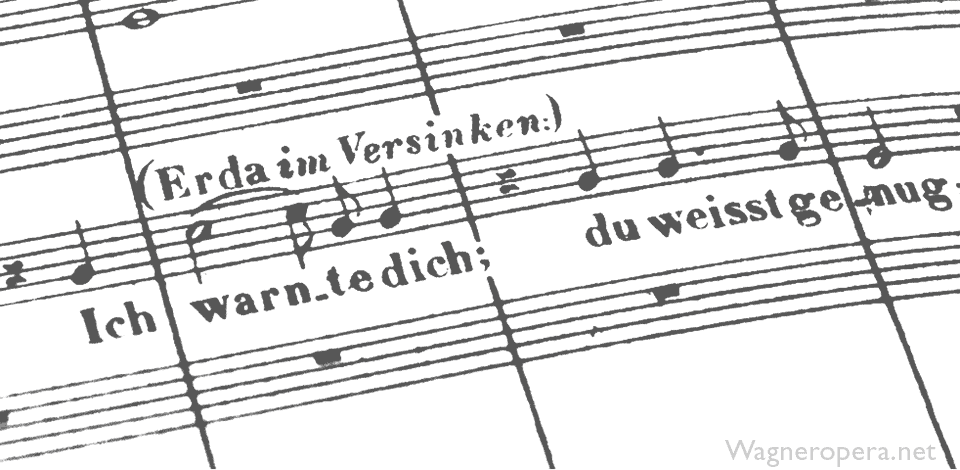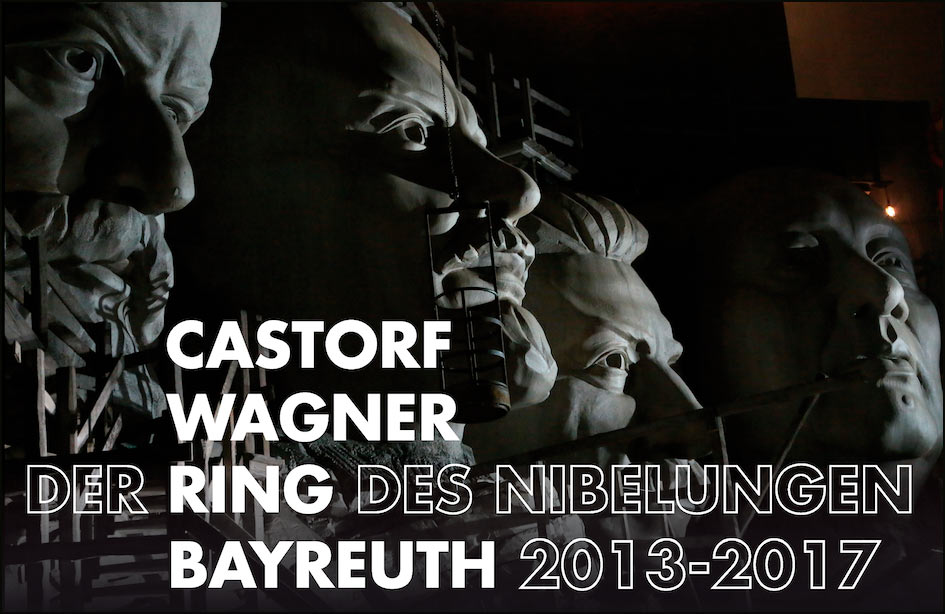Das Rheingold
Das Rheingold delves into themes of power, sacrifice, and the consequences of greed. The opera weaves a complex narrative where characters make fateful choices that shape their destinies. Das Rheingold explores the intrinsic human desires for wealth, power, and love, and the ensuing conflicts that arise from their pursuit.
Das Rheingold is the first opera in Der Ring des Nibelungen. Wagner calls it a preliminary evening (Vorabend). Its premiere was on 22 September 1869 at the Königlichen Hof- und Nationaltheater in Munich.
The premiere as part of a complete Ring production was on 13 August 1876 at the Festival House in Bayreuth.

In Richard Wagner's opera "Das Rheingold," the narrative unfolds in the mythical realm of the Rhine, where the Rhinedaughters safeguard the Rhinegold. Alberich, a Nibelung dwarf, becomes enchanted by the sight of the gold. The Rhinedaughters inform him that whoever forges the gold into a ring will gain dominion over the world, but at the cost of renouncing love. Frustrated by his unsuccessful attempts to capture one of the maidens, Alberich relinquishes love and seizes the gold.
Wotan, the ruler of the gods, finds himself reproached by his wife, Fricka, for promising to offer the goddess of youth, Freia, to the giants Fasolt and Fafner in exchange for constructing Valhalla for the gods. As the giants demand their reward, Loge, the god of fire, proposes an alternative payment: Alberich's gold. The giants agree, and Wotan, accompanied by Loge, embarks on a journey to Nibelheim, the underground realm of the Nibelungs.
In Nibelheim they encounter Alberich's brother, Mime, who has fashioned the Tarnhelm, a magical helmet that can transform its wearer's appearance. Mime reveals how Alberich has enslaved the Nibelungs to serve him. Alberich appears and taunts the gods. Upon Loge's request, he demonstrates the power of the Tarnhelm by morphing into a dragon and then a toad, which the gods successfully capture. Alberich is compelled to summon the Nibelungs to pile up the gold. Wotan seizes the ring from Alberich's finger, prompting the dwarf to curse the ring, foretelling eternal unrest and death for its possessor.
Returning to the giants, the gods offer the gold as payment, but they must also relinquish the Tarnhelm. Wotan, however, refuses to part with the ring. Erda, the goddess of the earth, appears and warns Wotan that the ring's possession will lead to the downfall of the gods. Reluctantly, Wotan hands over the ring to the giants, resulting in Fafner killing his brother Fasolt in a dispute over the treasure. As the Rhinemaidens' lamentations echo through the air, mourning the loss of their gold, the gods march towards their new abode, named Valhalla by Wotan.
Das Rheingold (as part of the complete Ring des Nibelungen) was produced in the following cities the first years after the world premiere at the Bayreuth Festival on 13 August 1876
| 1878 | München |
| 1879 | Wien |
| 1880 | Hamburg |
| 1881 | Berlin (Angelo Neumann's travelling Wagner-Theatre with guest performances in Berliner Viktoria-Theater) |
| 1882–1883 | Angelo Neumann's travelling Wagner-Theatre on tour: London (Her Majesty's Theatre), Breslau, Königsberg, Danzig, Hannover, Bremen, Barmen, Dresden, Amsterdam, Brüssel, Aachen, Düsseldorf, Mainz, Darmstadt, Karlsruhe, Strassburg, Stuttgart, Basel, Venice, Bologna, Rome, Torino, Triest, Budapest, Graz – totaling 135 performances of the Ring! |
Tcherniakov Ring, Staatsoper Berlin
→ Tcherniakov: Das Rheingold, Staatsoper Berlin, 2022
→ Tcherniakov: Die Walküre, Staatsoper Berlin, 2022
→ Tcherniakov: Siegfried, Staatsoper Berlin, 2022
→ Tcherniakov: Götterdämmerung, Staatsoper Berlin, 2022
Das Rheingold (complete) approximate timings
| 2.17 | Heinz Tietjen, Bayreuth 1934 |
| 2.21 | Siegfried Wagner, Bayreuth 1896 |
| 2.21 | Michael Balling, Bayreuth 1909 |
| 2.22 | von Hoesslin, Bayreuth 1927 |
| 2.23 | Keilberth, Bayreuth 1953 |
| 2.23 | Franz Beidler, Bayreuth 1904 |
| 2.25 | Herbert von Karajan, Bayreuth 1951 |
| 2.26 | Georg Solti, Wiener Philharmoniker 1958 (CD) |
| 2.27 | Gergiev |
| 2.28 | Michael Schønwandt (The Copenhagen Ring) |
| 2.28 | Marek Janowski 1980 |
| 2.29 | Daniel Barenboim, Bayreuth 1991 |
| 2.31 | Karl Richter, Bayreuth 1876 |
| 2.32 | Felix Mottl, Bayreuth 1896 |
| 2.32 | Lothar Zagrosek, Stuttgart Ring (DVD) |
| 2.34 | Daniel Barenboim, Bayreuth 1991 (DVD) |
| 2.36 | Wilhelm Furtwängler, Bayreuth 1936 |
| 2.39 | Elmendorff, Bayreuth 1930 |
| 2.42 | Hans Knappertsbusch, Bayreuth 1951 |
| 2.43 | James Levine, Metropolitan 1990 (DVD) |
Sources: Richard Wagner Museum Bayreuth, CD booklets, Per-Erik Skramstad
So there was much in 1876 that could never be repeated – Wagner, of course, in his full creative power and the splendid setting of Bayreuth that gave us such freedom for expression. As Rhine-maidens we played our part to the full – gay and capricious of mood at the beginning of Rheinhold and grave in our solemn warning to Siegfried in the last act of Götterdämmerung. And here I must mention that I always sang in my part in Rheingold – ‘Nur wer der Minne Macht entsagt’ never versagt as I always heard it sung later. I drew Levi’s attention to this in 1884 at Munich, when he wanted me to sing ‘versagt’ instead of ‘entsagt’.
Lilli Lehmann in her memoirs
The Anvils in Nibelheim (Bayreuth)
Said about Das Rheingold
Peter Tchaikovsky on Das Rheingold
Musically, it is inconceivable nonsense, in which here and there occur beautiful, and even captivating, moments.
In a letter to Modeste Tchaikovsky, written 14 August 1876 (Bayreuth - The Early Years)
Weiche, Wotan, Weiche – Erda's Warning to Wotan
Oralia Dominguez.

Der Ring des Nibelungen: Articles and Reviews
Nila Parly on Regietheater: Visions of the Ring
The Cry of the Valkyrie: Feminism and Corporality in the Copenhagen Ring
Sam Goodyear, Bayreuth 2022: Der Ring des Nibelungen (Valentin Schwarz)
Mark Berry, Bayreuth 2022: Das Rheingold (Valentin Schwarz)
Mark Berry, Bayreuth 2022: Die Walküre (Valentin Schwarz)
Mark Berry, Bayreuth 2022: Siegfried (Valentin Schwarz)
Mark Berry, Bayreuth 2022: Götterdämmerung (Valentin Schwarz)
Mark Berry: Bayreuth 2017: Das Rheingold (Frank Castorf / Marek Janowski)
Mark Berry: Bayreuth 2017: Die Walküre (Frank Castorf / Marek Janowski)
Mark Berry: Bayreuth 2016: Das Rheingold (Frank Castorf)
Mark Berry: Bayreuth 2016: Die Walküre (Frank Castorf)
Mark Berry: Bayreuth 2016: Siegfried (Frank Castorf)
Mark Berry: Bayreuth 2016: Götterdämmerung (Frank Castorf)
Mark Berry: Bayreuth 2014: Das Rheingold (Frank Castorf)
Mark Berry: Bayreuth 2014: Die Walküre (Frank Castorf)
Mark Berry: Bayreuth 2014: Siegfried (Frank Castorf)
Mark Berry: Bayreuth 2014: Götterdämmerung (Frank Castorf)
Per-Erik Skramstad: Bayreuth 2013: There Will Be Blood: Frank Castorf Has Entered the Ring
Per-Erik Skramstad: Bayreuth 2010: Curtain Down on Tankred Dorst's Ring
Mark Berry: 2010 Cassiers Ring
Sam Goodyear: Laufenberg’s Wiesbaden Ring 2017
Jerry Floyd: Rheingold, Metropolitan 2010
Jerry Floyd: Die Walküre, Metropolitan 2010
Jerry Floyd Washington National Opera: Siegfried
Jerry Floyd Washington National Opera: Siegfried II
Jerry Floyd Washington National Opera: Götterdammerung Concert (2009)
Jerry Floyd Washington National Opera: Götterdammerung Concert (2009)
Mark Berry: Richard Wagner für Kinder – Der Ring des Nibelungen (2011)
CASTORF / WAGNER Der Ring des Nibelungen 2013-2017: Bilingual book (French/German)

CASTORF / WAGNER Der Ring des Nibelungen 2013-2017: Bilingual book (french/german) about Frank Castorf's Ring production at Bayreuth edited by Guy Cherqui and David Verdier (Wanderer, Geneva)
Essays and Interviews Katharina Wagner (artistic director, Bayreuth), Frank Castorf (stage director), Aleksandar Denic (stage designer), Patric Seibert (assistant/actor), Adriana Braga Peretzki (costume designer), Wolfgang Koch (Wotan), Nadine Weissmann (Erda)...
Ring ABC
62 entries by Guy Cherqui and David Verdier
Specifics 26x17 cm 384 pages 200+ color plates, most of them exclusive photos
La Pommerie Éditions in collaboration with the Wanderer website ISBN 978-2-9564912-0-0 Info castorf.ringbook@wanderersite.com
More info here!
With essays by, and interviews of, the main architects of this project, this book aims for an in-depth analysis of the main lines of enquiry of a work that has already assured its place among the greatest Bayreuth productions. Frank Castorf’s theater has found in Wagner an ideological and polemic sounding board that echoes our most extreme issues of the day. The second part of the book is a lexicon of characters, themes and references that offers both readers and viewers points of orientation in the Castorfian Gesamtkunstwerk.



